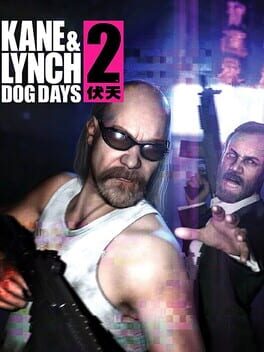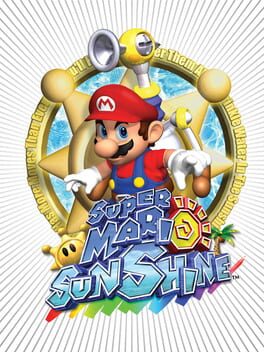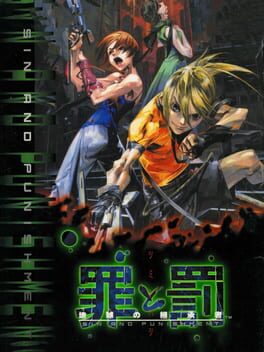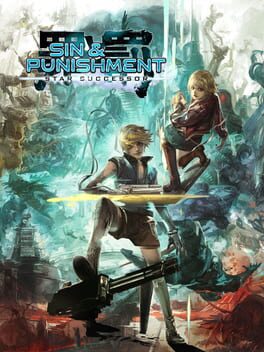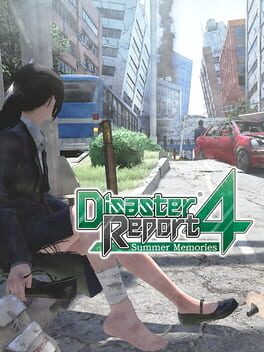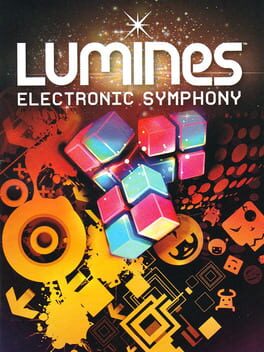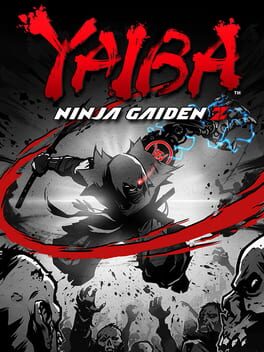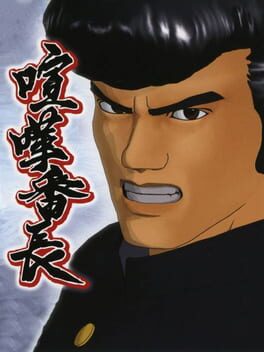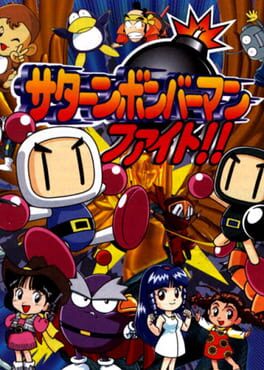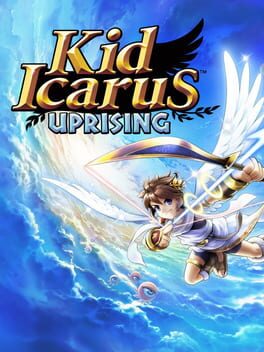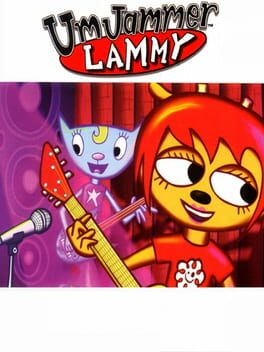2418 Reviews liked by Ardwyw_mp3
Super Mario Sunshine
2002
I had heard that this game could present a lot of jankiness. It's true, this game's particular feel and physics are more prominent than 64's, but I think it's the same aim this previous game has: making difficult for the player to have an absolute control over the avatar, Mario. The main goal is to create accidents as interesting as victories, and as far as I've seen, it really works. For me at least.
I just found fascinating how one shine could lend to soo many different outcomes.
I just found fascinating how one shine could lend to soo many different outcomes.
Xenogears
1998
This review contains spoilers
Didn't actually replay but after reading some reviews/analyses of this I felt like I had to talk about how people who write about this game focus far, far too much on the game's relationship and allusions to Lacan, Jung, Freud, and Gnosticism; something that is understandable given that these connections are the most obvious and flashy within the context of the narrative but isn't conducive to more expansive discussion about what is, in my humble opinion, the greatest narrative work in the history of the medium.
Now I do not believe that this game necessarily has anything new or meaningful to say when it comes to Lacan, Jung, Freud, and Gnosticism, but it doesn't matter because the narrative is not about those things in the first place, nor does it give pretense to commenting on those subjects; in the same way that Evangelion doesn't really have anything meaningful to say about Christianity or the Kabbalah, but instead uses the associated imagery and symbology to accentuate the collapsing psychological state of its protagonists, Xenogears uses such subjects in a similar manner but to serve a story less about killing God and the literal fracturing of a human psyche into separate personalities and more of a requiem for all the people whose lives have been crushed by oppressive systems whose breadth and scope was beyond their comprehension, and about the tragedy of the passage of time, of the struggle of two souls to find happiness in a world where the people that control it no longer believe happiness is possible, and because of this they bring the world to near-oblivion. Yet it is also about how only through the progression of time can the path to actually destroying those systems be found.
In this, there's something to be said for how Xenogears' politics manifest within the narrative; the most obvious real-life parallel people come to when talking about story's antagonists is between the nation of Solaris and Nazi Germany, but an even more cogent comparison could be made between Solaris and the American Empire. Upon entering Solaris, Fei is confronted by a clean, almost sterile, consumerist environment that, to an outsider, would look utopian, and this façade is emphasized by Yasunori Mitsuda's bouncy, light-hearted musical theme accompanying it. Of course this "utopia" is built atop the back of an abused labor class forced to live in purely functional, beehive-like housing (it should be noted that subtlety is a fake idea), at the mercy of police robots and under constant surveillance. And it's important that we're presented with the plight of Solaris' labor force before we are shown the façade itself, because upon entering the musical theme immediately takes on an ironic quality, and we implicitly understand the ignorance at the heart of Solaris' middle class before we've talked to a single NPC.
Going deeper, the Solarian middle class concerns itself solely with maintaining their status, having no knowledge of the havoc their nation wrecks on the surface and passively reap the rewards of its deeds. The Ethos exists to pacify the surface's general populace into being unaware of their oppression while funneling resources and funds to Solaris. Miang effectively MK-Ultra's Elly into almost blowing up the Yggdrasil. A tenant of Ramsus' backstory is how originally he advocated for reform within Solaris' political system before becoming subsumed by it, something all too common in our current political era. The entire conflict between Solaris and Shevat could be compared to the conflict between America and any socialist country (and I believe there is some dialogue from Shevat NPC's that emphasizes this comparison but I failed to write it down). And of course it's telling that Bart's decision upon taking control of Aveh is to abolish the monarchy and essentially establish a people's republic after overthrowing the Solaris-funded puppet government headed by Shakhan. The comparisons abound and I'm surprised more people haven't touched on these elements, and I think it's important that besides possibly Final Fantasy Tactics I can't recall a game from this era where a lot of its world-building is so centered around exploring labor and class structure.
I believe there's more to be said regarding the tragedy of Fei and Elly's backstories and how it relates to its ideas on the passage of time, ideas even hinted at in the game's excised theme "Stars of Tears." The section in Disk 2 where Fei regains his memories as Elly's plea for him to keep living echoes through time is the most singularly moving sequence I've yet encountered in a video game, the moment that blows the medium wide-open in its potential for conveying narratives, and this will have to transition into why exactly Disk 2 is as brilliant as it is, but that may all have to wait for yet another write-up after I've gathered my thoughts a bit more. Needless to say I think the focus on the extremely obvious allusive elements in critical writing on this game is disappointing considering just how much there is to unpack regarding its story.
Now I do not believe that this game necessarily has anything new or meaningful to say when it comes to Lacan, Jung, Freud, and Gnosticism, but it doesn't matter because the narrative is not about those things in the first place, nor does it give pretense to commenting on those subjects; in the same way that Evangelion doesn't really have anything meaningful to say about Christianity or the Kabbalah, but instead uses the associated imagery and symbology to accentuate the collapsing psychological state of its protagonists, Xenogears uses such subjects in a similar manner but to serve a story less about killing God and the literal fracturing of a human psyche into separate personalities and more of a requiem for all the people whose lives have been crushed by oppressive systems whose breadth and scope was beyond their comprehension, and about the tragedy of the passage of time, of the struggle of two souls to find happiness in a world where the people that control it no longer believe happiness is possible, and because of this they bring the world to near-oblivion. Yet it is also about how only through the progression of time can the path to actually destroying those systems be found.
In this, there's something to be said for how Xenogears' politics manifest within the narrative; the most obvious real-life parallel people come to when talking about story's antagonists is between the nation of Solaris and Nazi Germany, but an even more cogent comparison could be made between Solaris and the American Empire. Upon entering Solaris, Fei is confronted by a clean, almost sterile, consumerist environment that, to an outsider, would look utopian, and this façade is emphasized by Yasunori Mitsuda's bouncy, light-hearted musical theme accompanying it. Of course this "utopia" is built atop the back of an abused labor class forced to live in purely functional, beehive-like housing (it should be noted that subtlety is a fake idea), at the mercy of police robots and under constant surveillance. And it's important that we're presented with the plight of Solaris' labor force before we are shown the façade itself, because upon entering the musical theme immediately takes on an ironic quality, and we implicitly understand the ignorance at the heart of Solaris' middle class before we've talked to a single NPC.
Going deeper, the Solarian middle class concerns itself solely with maintaining their status, having no knowledge of the havoc their nation wrecks on the surface and passively reap the rewards of its deeds. The Ethos exists to pacify the surface's general populace into being unaware of their oppression while funneling resources and funds to Solaris. Miang effectively MK-Ultra's Elly into almost blowing up the Yggdrasil. A tenant of Ramsus' backstory is how originally he advocated for reform within Solaris' political system before becoming subsumed by it, something all too common in our current political era. The entire conflict between Solaris and Shevat could be compared to the conflict between America and any socialist country (and I believe there is some dialogue from Shevat NPC's that emphasizes this comparison but I failed to write it down). And of course it's telling that Bart's decision upon taking control of Aveh is to abolish the monarchy and essentially establish a people's republic after overthrowing the Solaris-funded puppet government headed by Shakhan. The comparisons abound and I'm surprised more people haven't touched on these elements, and I think it's important that besides possibly Final Fantasy Tactics I can't recall a game from this era where a lot of its world-building is so centered around exploring labor and class structure.
I believe there's more to be said regarding the tragedy of Fei and Elly's backstories and how it relates to its ideas on the passage of time, ideas even hinted at in the game's excised theme "Stars of Tears." The section in Disk 2 where Fei regains his memories as Elly's plea for him to keep living echoes through time is the most singularly moving sequence I've yet encountered in a video game, the moment that blows the medium wide-open in its potential for conveying narratives, and this will have to transition into why exactly Disk 2 is as brilliant as it is, but that may all have to wait for yet another write-up after I've gathered my thoughts a bit more. Needless to say I think the focus on the extremely obvious allusive elements in critical writing on this game is disappointing considering just how much there is to unpack regarding its story.
